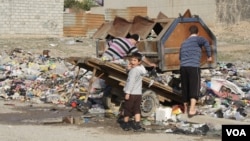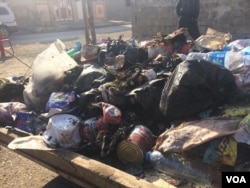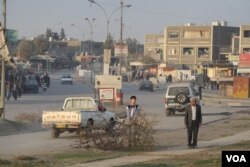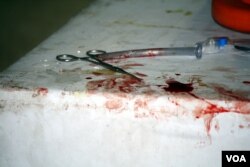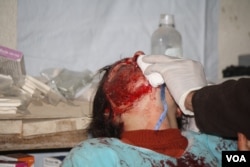"On the day the Iraqi forces took our street, we immediately shaved our beards," said 27-year-old Ashraf, outside his Mosul shop selling items like snacks, shampoo and eggs.
The IS-style beards, mandated by Islamic State militants, were considered a symbol of subservience to the dictatorial and violent group that held Mosul for two-and-a-half years, and still rules much of the city and beyond.
"Later that day, we heard shouts of ‘Allahu Akbar!' coming from behind the Iraqi army lines," he continued, laughing. After 20 days of hiding from bombs in a bathroom, he recalls the IS retreat with joy.
"We thought maybe they were counterattacking, so we ran to the sinks to retrieve our hair," he joked.
The Iraqi Army's Golden Division held Ashraf's area and later moved deeper into the city. An increasingly swift offensive against the group gained momentum last week; but, the destruction IS left behind, including the rapid loss of all municipal services, continues to plague every aspect of life in Mosul.
"That pile has been here for two months," he said, leaning on his shop door and pointing to one of eastern Mosul's massive and growing heaps of garbage. "The most important thing we need is to get rid of the trash. Besides the smell and pollution, it is causing traffic jams."
Often for a fee, IS provided municipal services, like trash pickup, some running water and a few hours of electricity a day during the winter. Minimal services, however, were never enough to make living in what locals describe as a prison-city bearable.
Ashraf steps to the edge of the wooden porch and points to various sights on the street.
"On this street there was a car bomb," he said, and nearby "a truck exploded and three houses collapsed."
The main visible Iraqi authorities in Mosul now are military forces who tend to some immediate humanitarian needs, like rushing victims of IS mortars and drone bombs to field hospitals, and sharing their food, mattresses and other emergency aid with the city.
Locals say efforts are being made, but municipal services are slow to materialize, as Iraqi authorities focus on defeating IS, having just reached the strategic, and symbolic, Tigris River.
"The enemy took this river as a natural obstacle and they destroyed all small bridges," said Sabah Numan, spokesman for the Iraqi Counterterrorism Services, referring to a 30-meter-wide branch of the Tigris that Iraqi forces crossed in a surprise attack early Saturday morning.
"Within three hours, we announced this neighborhood free and liberated from IS," he said.
Health risks
In another part of eastern Mosul that has been under Iraqi army control for almost two months, neighbors sweep trash piles from the streets onto a cart, and deposit them in a rubbish-strewn field surrounding a dumpster.
"Many children will get sick, and we have no medicine," said Dhya, a cook who makes an Iraqi specialty dish of beef stuffed with rice. In this area they have heard government dump trucks are on their way, so he and other neighbors have volunteered to consolidate the mess.
"We heard tomorrow they will come, but we don't know," Dhya said.
In Mosul and refugee camps surrounding the city, a chief complaint among families is the lack of available medical care. In a Mosul field hospital Sunday, officials said they were overwhelmed with emergencies from ongoing battles.
Dozens of patients — sometimes more — are rushed daily to the makeshift hospital, a former mosque with barebones facilities, say medics. Many are treated immediately, then loaded into an ambulance bound for modern hospitals in Irbil, a Kurdish city about an hour away.
"We have intelligence there was another car bomb," said one Iraqi Army major, minutes before ambulances started whipping into the dusty car park. Two women with faces dripping in blood limp in, leaning on medics, while gravely injured men are brought in on stretchers. More patients follow.
"A car bomb exploded between where we were stationed and the homes," said Mirkhan, a soldier covered with dust and minor shrapnel wounds inside the hospital. "Their houses collapsed on them."
Future hope
The sadness is palatable in Mosul, with seemingly every family having a story of loss.
"On the street over there a house collapsed when a bomb exploded," said 21-year-old Mustafa, barely glancing up as the sound of an airstrike circles the sky. "There are 14 bodies of that family now buried in their garden."
Rumor has it schools will open within a year, and for young people like Mustafa, who are excited to go back, the recent months of violence have brought more hope than they have seen since IS took over.
"There wasn't shooting on the streets under IS," he said, "but it was like living in a prison. There was nowhere to go."




